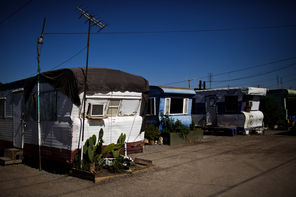Originally published in the Seattle Times Thursday, June 5, 2014
With more of the middle class sliding downward and many towns banning new trailer parks, enterprising owners are getting rich renting the concrete pads and surrounding dirt on which residents park their homes.
Bloomberg News
When Dan Weissman worked at Goldman Sachs Group and, later, at a hedge fund, he didn’t have to worry about methamphetamine addicts chasing his employees with metal pipes. Or SWAT teams barging into his workplace looking for arsonists.
Both things have happened since he left Wall Street and bought five mobile-home parks: four in Texas and one in Indiana. Yet he says he’s never been so relaxed in his life.
The University of Michigan economics graduate attributes his newfound calm to the supply-demand equation in the trailer-park industry. With more of the U.S. middle class sliding downward and many towns banning new trailer parks, enterprising owners are getting rich renting the concrete pads and surrounding dirt on which residents park their homes.
“The greatest part of the business is that we go to sleep at night not ever worrying about demand for our product,” Weissman says. “It’s the best decision I’ve ever made.”
Better yet, Weissman says, the field isn’t packed with the hyper-driven geeks and MBAs who crowd technology and finance in the San Francisco Bay Area, where he and David Shlachter, his business partner and brother-in-law, both live.
“You’ve got a lot of really smart people trying to come up with a better way to put a calendar on an iPhone,” says Shlachter, who has a master’s degree in development economics from Harvard’s Kennedy School of Government. “We’d rather sit at a different poker table, where none of those people dare to go because it doesn’t sound good at a cocktail party.”
Weissman and Shlachter are part of a white-collar exodus to rougher industries, as investors seek yield amid chronically low rates or steady income after being cast out from finance or law.
In 2009, Ed Vasser left his job at a hedge fund and started investing his own capital in a wide range of down-and-dirty investments, including subsidized housing, storage units and tax liens. He’s buying part of a truck wash.
“I like to say I turned in my Rolex for a pinkie ring,” Vasser says.
The economics of mobile homes are particularly alluring to folks who’ve made their living in the markets. Many counties in the U.S. have banned or discouraged new trailer parks because the inhabitants pay little in taxes and drain resources. Yet demand is higher than ever, investors say, because so many people never got back on their feet after the recession.
David Protiva, a former mortgage-backed-bond salesman, now owns four trailer parks in Georgia. He’s noticed that until 2008, most people coming into his parks were moving up; they owned nothing before buying a trailer. Since 2009, half his residents have come to him from conventional homes, he says.
Roughly 6 percent of Americans lived in mobile homes in 2012, according to the U.S. Census Bureau. Until recently, billionaire Sam Zell and a few other investors had the market to themselves.
“We like the oligopoly nature of our business,” Zell said on a 2012 analyst conference call for his Equity Lifestyle Properties, which owns 71,500 trailer sites.
Warren Buffett targeted the industry more than a decade ago when he purchased Clayton Homes, the largest manufacturer of mobile homes. Now, private-equity firms are starting to prowl the parks.
Carlyle Group bought two in Florida in October for a combined $31 million. Both are high-end senior parks, where tenants must be 55 or over, and one is just steps from the Atlantic.
The new tycoons in the business are professionals like Weissman and Shlachter, who are willing to buy smaller, sometimes squalid parks, where tenants have damaged credit and maybe criminal records.
The sellers are often mom-and-pop owners who set up the parks in the 1960s and 1970s and have little incentive to improve them because tenants can’t afford to leave. One Colorado owner bragged to Shlachter about never plowing the snow, which saved him money.
“It’s hairy, and it’s colorful, and it’s sometimes scary,” Shlachter says.
Weissman and Shlachter take pride in improving the lives of residents in some of the more rundown parks they’ve bought. And they say owning trailer parks has taught them what it’s like to be low income in America.
Many tenants can’t get bank accounts because they have wretched credit. Instead, they use prepaid debit cards that charge a fee of as much as $4 to load just $20 onto them.
“It’s expensive to be poor,” Shlachter says.
The biggest eye-opener, they say, has been finding so many capable people banished to poverty by a stupid mistake, like getting busted for drugs. Weissman and Shlachter hire those people as managers, with, they say, excellent results. They give them incentives for collecting 100 percent of the rents on time and for finding tenants for vacant sites.
Frank Rolfe and his partner, Dave Reynolds say the 20 percent return many parks throw off annually is enough to get the genteel set over the idea of owning a community of double-wides.
Rolfe and Reynolds own 100 parks in 16 states and also run the Mobile Home University, an academy that holds three-day boot camps for aspiring trailer lords for $1,999 a person. Rolfe says an increasing number of his students are bankers and engineers.
The beauty of a trailer park for its owner is that once a tenant trucks a home to a site, then lowers it onto a pad and hooks up to the electricity and septic systems, he’s unlikely to leave. It costs at least $5,000 to move a home, a sum that trailer dwellers rarely accumulate more than once, Rolfe says.
“We’re like a Waffle House where everyone is chained to the booths.”
